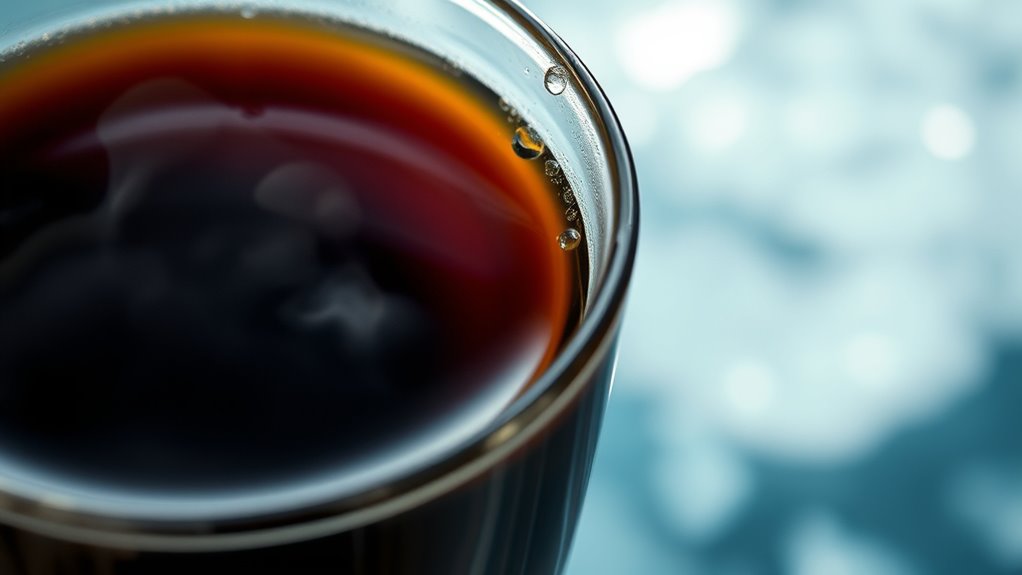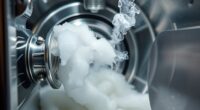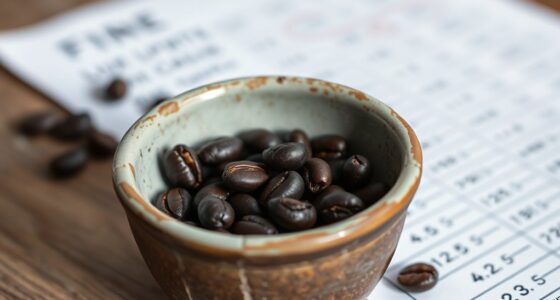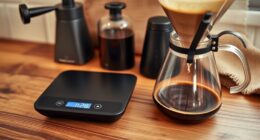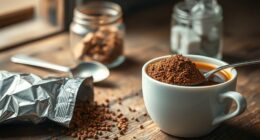Water quality considerably influences your coffee’s flavor and aroma. Minerals like calcium and magnesium enhance sweetness and clarity but too much can cause bitterness or dull bright notes. Soft water preserves delicate flavors, while hard water can lead to over-extraction and mineral buildup. Contaminants like chlorine or metals can mask aroma or leave metallic tastes. Understanding these factors helps you optimize your brew—if you want to explore how to improve your water for better coffee, you’ll find helpful tips ahead.
Key Takeaways
- Mineral content, especially calcium and magnesium, significantly influences coffee flavor, enhancing sweetness and clarity or causing bitterness.
- Water pH and alkalinity affect acidity levels and can dull or brighten coffee’s flavor profile.
- Ideal TDS levels (75-250 mg/L) ensure proper extraction, avoiding weak or over-extracted, bitter tastes.
- Contaminants like chlorine or metals can mask delicate aromas and introduce off-flavors.
- Water hardness impacts extraction and equipment maintenance, with soft water preserving subtle notes and hard water risking over-extraction.
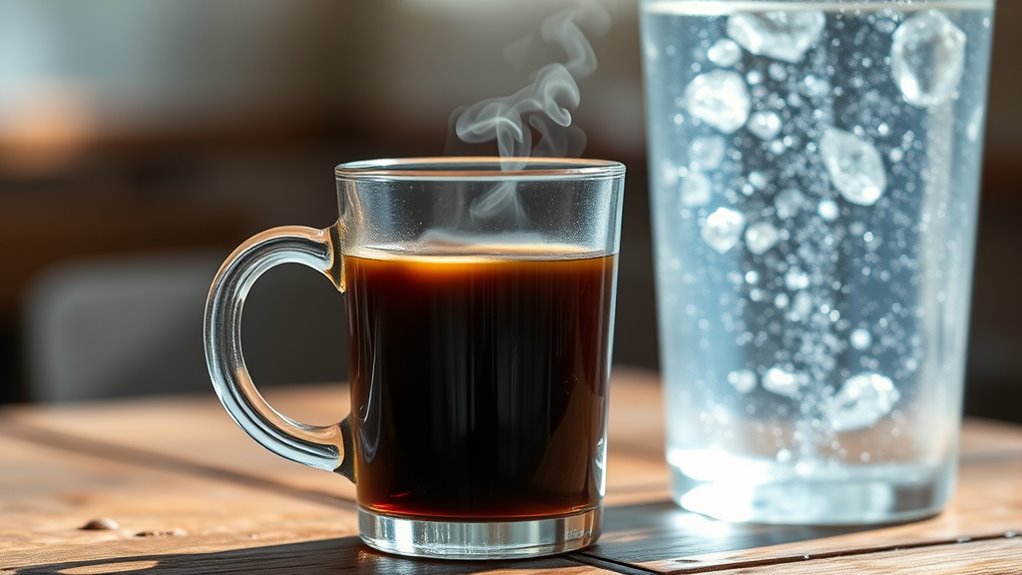
Have you ever wondered why your coffee tastes different depending on the water you use? The answer lies in water’s composition and how it interacts with coffee’s delicate balance of flavors. Coffee’s natural pH ranges between 4.85 and 5.10, making it weakly acidic. When you brew with alkaline water (pH above 6), it neutralizes some of this acidity, reducing sourness and potentially dulling the bright, vibrant notes you seek.
Water’s pH level influences coffee’s brightness and acidity, shaping the overall flavor profile of your brew.
Conversely, using hard water, which has high mineral content, can amplify bitter flavors during extraction. These minerals, especially calcium and magnesium, influence how flavors develop—calcium can enhance sweetness but requires careful balance, while magnesium sharpens clarity but risks over-extraction in excessively hard water.
Soft water, with low carbonate hardness, preserves the more subtle aromas and acidity that define a well-rounded cup. When water lacks minerals altogether, like distilled water, it often produces flat-tasting coffee because extraction becomes inefficient, stripping away complexity. The mineral content plays a vital role: calcium contributes to sweetness, but too much can make the brew overly smooth or even dull; magnesium boosts flavor clarity but can lead to bitterness if concentrations are off.
Sodium can add a perception of saltiness at higher levels, and hydrogen carbonate reacts with acids, sometimes resulting in a harsher, more bitter profile. That’s why many specialty coffee associations recommend soft water for achieving a balanced, complex flavor profile.
The Total Dissolved Solids (TDS) level in your water also impacts extraction. Ideal TDS for brewing falls between 75 and 250 mg/L. Too low—below 50 mg/L—causes under-extraction, resulting in weak, hollow flavors that lack body. Too high, above 300 mg/L, leads to over-extraction, which emphasizes harsh bitterness and astringency.
Many commercial espresso machines aim for around 150 mg/L to balance acidity and body. Using a TDS meter helps you fine-tune your water, ensuring consistent results with each brew.
Contaminants like chlorine, microplastics, and metallic ions can sabotage your coffee’s flavor. Chlorine masks delicate aromas, while microplastics can introduce off-flavors, even at low levels. Metallic ions like iron or copper can leave metallic aftertastes, and organic compounds may alter mouthfeel and perceived acidity.
Filtration systems like carbon filters can remove chlorine and organics but often leave mineral content intact. Conversely, reverse osmosis systems eliminate nearly all contaminants, including minerals, leading to a very neutral water profile.
Water hardness directly affects brewing outcomes. Hard water—above 150 mg/L CaCO₃—tends to over-extract bitter compounds and can cause mineral buildup in equipment. Carbonate hardness, specifically, correlates with flavor flatness, while temporary hardness from calcium bicarbonate causes scale issues.
Using reverse osmosis or specialized filtration can reduce these issues considerably. Temperature also influences extraction: brewing between 195-205°F (90-96°C) ensures balanced dissolution of sugars, acids, and tannins. Lower temperatures underdevelop flavors, while higher temperatures accelerate tannin extraction, increasing bitterness.
Preheating your brewing vessel and using temperature-controlled kettles help maintain consistent extraction conditions. Additionally, water mineralization techniques can help adjust mineral levels to optimize flavor extraction.
Different filtration systems serve various purposes. Activated carbon filters remove chlorine and organics but leave minerals untouched. Reverse osmosis eliminates nearly all impurities, providing pure water ideal for precise brewing. Ion exchange systems reduce hardness but add sodium ions, which can subtly influence flavor. Ceramic filters trap sediments without changing mineral levels.
Combining these technologies, like multi-stage filtration systems, optimizes water quality for brewing the best coffee possible.
Frequently Asked Questions
How Does Water Temperature Influence Coffee Extraction?
You see, water temperature directly impacts coffee extraction because hotter water pulls more solubles from the grounds, enhancing flavor and body.
If it’s too hot, you risk over-extraction, leading to bitterness and burnt notes.
Too cold, and you under-extract, resulting in sourness and thinness.
Maintaining the ideal range (195°F-205°F) guarantees a balanced brew, highlighting sweetness, acidity, and aroma without overpowering or underdeveloping the flavors.
Can Mineral Content in Tap Water Vary Seasonally?
Yes, mineral content in your tap water can vary seasonally. During summer, higher temperatures cause increased mineral dissolution from rocks and soil, raising calcium, magnesium, and sulphate levels.
In spring and fall, rainwater dilutes groundwater, lowering mineral concentrations.
Winter effects depend on your region’s climate, but overall, these seasonal fluctuations impact water hardness and mineral levels, making it important to test your tap water regularly to guarantee ideal brewing conditions.
What Are Common Contaminants Affecting Water Used for Coffee?
When it comes to water for coffee, a little knowledge goes a long way. You should watch out for common contaminants like chlorine and chloramine, which can give your brew a chemical aftertaste.
Heavy metals like copper or manganese might lend a metallic flavor. Volatile Organic Compounds (VOCs) and disinfection byproducts can also sneak in, disrupting taste.
Filtering your water helps, so you’re not fighting an uphill battle with poor quality water.
How Does Water Ph Impact Coffee Flavor?
Water pH substantially impacts your coffee flavor by altering its acidity.
When you use water with a higher pH, above 6, it reduces the coffee’s natural sharpness, making it taste flatter and less vibrant.
Conversely, more acidic water enhances brightness and complexity.
Maintaining a balanced pH, ideally slightly acidic, ensures you get the best extraction and flavor profile, making your coffee more enjoyable and well-rounded.
Are Filtered Waters Always Better for Brewing Coffee?
You might think filtered water is always better for brewing coffee, but that’s not necessarily true. While it often provides consistent flavor and reduces bitterness, over-filtered water can lack essential minerals needed for proper extraction.
It’s important to find a balance, ensuring your water is clean and mineral-rich enough to bring out the best flavors. Experiment with different filtration levels to discover what works best for your coffee and taste preferences.
Conclusion
As you sip your freshly brewed coffee, imagine the water as a hidden artist shaping every note and nuance. Pure, mineral-rich water paints your brew with vibrant flavors, while murky or hard water dulls its brilliance. By choosing quality water, you reveal a symphony of taste that dances on your palate, turning each cup into a morning masterpiece. So, pay attention to your water—the secret ingredient that transforms good coffee into an unforgettable experience.
